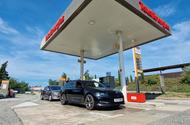Lane travelled 1113 miles before having to stop for fuel in a diesel Superb estate
Autocar road tester Richard Lane explains the benefits of the black pump for long-distance hauls
As road testers we can only road test what’s come fresh from the assembly lines and through the garage doors at Autocar HQ, and to say oil-burners have become an uncommon sight is an understatement.
In the summer we now see more mid-engined supercars than we do diesel models of any creed. Genuinely, in June you’re more likely to find a Lamborghini Huracán in our basement carpark than you are something whose red line sits below 5000rpm. Only five or ten years ago we were swimming in diesels.
Do I miss them? In general, not especially. Turbocharging had made even tiny petrol motors surprisingly torquey and even the very best four-pot diesels – one is the B47 from BMW, recently made even better with mild-hybridness – can still sound a bit rattly, which if nothing else feels weirdly anachronistic in the era of Tesla and a pure-electric Rolls-Royce.
It seems wild that Audi once seriously considered mainline production of an Audi R8 endowed with a 6.0-litre 740lb ft V12 TDI. What would those be worth now, 15p?
And yet diesel does still have a place: long-haul travel. Not very exciting, admittedly, but worthwhile and convenient and actually pretty stirring when you experience it, as I did last year. Having brimmed (and I mean brimmed) the 66-litre tank of a 2021 Skoda Superb Estate (flavour: 2.0 TDI, 150PS) in London and aimed the car at the Med, for the first of the eight digital fuel-gauge bars to remain lit at Reims was outrageous.
Okay, concessions were made, putting tyre pressures up a nudge and doggedly sticking below 70mph, but nothing onerous.
In the end, and including a day trip near Dijon and a few hilly escapades near Avignon, the Skoda went 1113 miles before we rolled onto a forecourt near Lyon on the way home, the range-indicator rolling to ‘0 miles’ right on cue. That’s London to Madrid non-stop, with a bit to spare.
Quite a lot of convenience, isn’t it? In the UK, with typical commutes and, say, two days working from home, you might conceivably go eight weeks between fill-ups. And while diesel costs more than petrol, I think the result of considerably fewer trips to the petrol station each year would usefully lower the perceived cost of running the car.
It’s one reason why people don’t like trains, even if, for them, it’s cheaper than car ownership. Paying every time you travel feels expensive.
In an efficient petrol car, things are a lot more simple, and in something like the diesel Skoda? Well, it almost feels a little like free transport.
Source: Autocar
